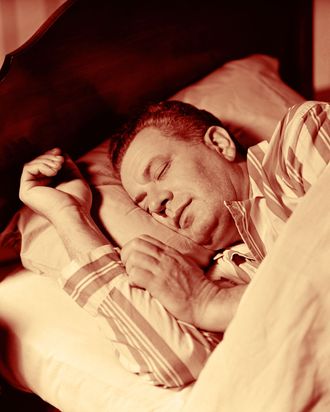
We know that all animals — or at least all animals that we’ve been able to study — sleep. And we we also know what happens when we don’t sleep — we become irritable, see our overall health suffer, hallucinate, have seizures, and eventually die. So in a very literal sense, we kind of know why we sleep; we close our eyes each night because those all sound like things to be avoided, if possible.
But more broadly, scientists haven’t yet been able to pin down what makes slumber so necessary, for humans or any other species. As the BBC noted last year, sleeping was a pretty big gamble for our ancestors, who left their bodies exposed to predators when they would lie down and close their eyes — meaning that evolutionarily speaking, whatever they got out of snoozing must’ve been well worth the trade-off.
One possible explanation is something known as the “housekeeping theory” — the idea that sleep gives the brain the down time it needs to prune away some of the connections between neurons, making room for whatever new information we’ll come across when we wake up. (Synaptic pruning, as it’s called, is also the process that allows a developing brain to assign certain functions to certain areas; overzealous pruning is thought to be a factor in Alzheimer’s disease, while an overabundance of unpruned connections have been found in the brains of people with autism.)
It’s a kind of neural Kondo-ing — clearing away the clutter to put the focus on the important stuff. Or as the theory’s originator, psychiatrist Giulio Tononi, put it to New Scientist: “Sleep is the price we pay for learning.” And in new research presented at last week’s Federation of European Neuroscience Societies meeting, New Scientist reports, Tononi and his team made the strongest case yet that this really is what’s going on:
Tononi’s team measured the size of these connections or synapses in brain slices taken from mice. The synapses in samples taken at the end of a period of sleep were 18 per cent smaller than those in samples taken from before sleep, showing that the synapses between neurons are weakened during slumber …
If the housekeeping theory is right, it would explain why, when we miss a night’s sleep, the next day we find it harder to concentrate and learn new information — we may have less capacity to encode new experiences. The finding suggests that, as well as it being important to get a good night’s sleep after learning something, we should also try to sleep well the night before. It could also explain why, if our sleep is interrupted, we feel less refreshed the next day. There is some indirect evidence that deep, slow-wave sleep is best for pruning back synapses, and it takes time for our brains to reach this level of unconsciousness.
To conduct their research, New Scientist added, Tononi and his colleagues took each mouse brain and “sliced it into ultrathin sections and used these to create 3-D models of the brain tissue to identify the synapses. As there were nearly 7,000 synapses, it took seven researchers four years.” Sounds like it’s finally time for a well-deserved nap.

